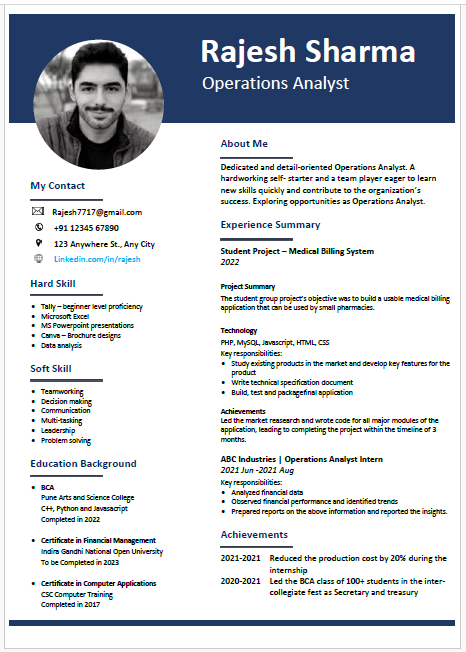Operations Analyst
BCA

About this template
This is a very professional resume which can significantly enhance your job prospects.
This resume is made by MS Word, featuring a clean and modern layout designed to highlight your skills and achievements.
Some most common and important interview questions for Entry Level Operations Analyst
Interviews for an Entry Level Operations Analyst position typically focus on assessing analytical skills, problem-solving abilities, understanding of operations management, and capacity to handle data-driven tasks. Here are ten common interview questions designed to evaluate these crucial skills:
1. Can you describe a time when you analyzed a process and recommended improvements?
This question assesses your analytical and problem-solving skills. Discuss a specific instance where you identified inefficiencies, analyzed the process, and proposed actionable improvements that enhanced productivity or reduced costs.
2. How do you prioritize tasks when managing multiple projects?
Effective task management is critical for an Operations Analyst. Explain your approach to prioritizing tasks, including how you assess urgency and importance, and any tools or methods you use to stay organized.
3. What software tools are you proficient in for data analysis?
Technical proficiency is key in this role. Detail your experience with tools such as Excel, SQL, or specific business intelligence software like Tableau or Power BI, and describe how you have used these tools in a project or academic setting.
4. How do you ensure accuracy in your work, especially when dealing with large datasets?
Accuracy is paramount in operations analysis. Discuss your strategies for maintaining data integrity, such as data cleaning practices, double-checking calculations, and using software functions to automate error checks.
5. Can you explain a complex data set you have worked with and the insights you derived from it?
This question tests your ability to handle complexity and extract meaningful insights. Share an example of a challenging data set you worked with, explaining the analysis techniques you used and the conclusions you reached.
6. What methods do you use to stay informed about industry trends relevant to operations management?
Keeping informed about industry trends indicates a proactive approach. Mention specific resources such as industry publications, seminars, webinars, or professional groups that help you stay updated.
7. Describe how you have used predictive analytics in a past project or academic exercise.
Predictive analytics is becoming increasingly important in operations. Detail an instance where you used predictive models to forecast outcomes, and discuss the impact of your findings on decision-making.
8. What experience do you have with project management, and how do you handle project deadlines?
Project management skills are essential for coordinating operations tasks. Describe your experience with managing projects, highlighting how you meet deadlines and coordinate with team members.
9. How would you explain a recommendation based on your analysis to a non-technical stakeholder?
Communication skills are critical. Describe how you simplify complex information into clear, actionable recommendations, ensuring that stakeholders without a technical background can make informed decisions.
10. Can you give an example of a time when you had to adapt quickly to a change in project requirements or business priorities?
Adaptability is a key trait for an Operations Analyst. Share a scenario where you had to quickly change your focus or strategy in response to new information or shifting priorities, and explain how you handled the transition.
Conclusion:
These questions are designed to uncover a candidate's technical capabilities, analytical thinking, and practical skills in managing operations data and processes, crucial for succeeding as an Operations Analyst.